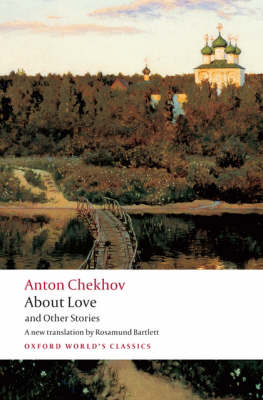By Kirsty McHugh, OUP UK
Rosamund Bartlett is a writer, translator, and lecturer, specialising in Russian literature, and translated the best-selling edition of Chekhov’s About Love and Other Stories for the Oxford World’s Classics series. She was also heavily involved in a recent set of events celebrating Chekhov at the Hampstead Theatre in London. In the original post below, to coincide with Chekhov’s 150th birthday, she talks about her campaign to restore his house in Yalta.
Anton Chekhov was born 150 years ago this week, in a little whitewashed house in the southern port of Taganrog. Forty four years later, his life was already over, his body ravaged by the tuberculosis he contracted when he was in his  twenties. He could have squandered his talent, like his elder brother Nikolai, and led a dissolute life, but he chose instead to value his creative gifts. He earned his literary stripes the hard way, by writing first for comic journals and newspapers, but he ended up becoming the greatest writer of his generation. He could have rested on his laurels after receiving accolades as both prose writer and dramatist, but he kept on writing, and producing masterpieces, even when he was too sick to prune his roses. He could have happily left his medical training behind after he qualified as a doctor, but he went out of his way to treat the peasants who lived near his country house, and supported efforts to provide community health care. He could have lived off the fat of the land, but provided for his parents and sister, quietly built three schools, planted trees, and undertook a grueling journey to the island of Sakhalin to make a study of its notorious penal colony. He was a consummate artist who went against the grain of Russian tradition by resolutely refusing to act as a moral guide, and a person of rare integrity who preferred to lose his closest friend rather than endure his anti-Semitism. He also never took himself seriously and indeed was cracking self-deprecating jokes until the very last. For all these reasons Chekhov’s 150th birthday is worth celebrating.
twenties. He could have squandered his talent, like his elder brother Nikolai, and led a dissolute life, but he chose instead to value his creative gifts. He earned his literary stripes the hard way, by writing first for comic journals and newspapers, but he ended up becoming the greatest writer of his generation. He could have rested on his laurels after receiving accolades as both prose writer and dramatist, but he kept on writing, and producing masterpieces, even when he was too sick to prune his roses. He could have happily left his medical training behind after he qualified as a doctor, but he went out of his way to treat the peasants who lived near his country house, and supported efforts to provide community health care. He could have lived off the fat of the land, but provided for his parents and sister, quietly built three schools, planted trees, and undertook a grueling journey to the island of Sakhalin to make a study of its notorious penal colony. He was a consummate artist who went against the grain of Russian tradition by resolutely refusing to act as a moral guide, and a person of rare integrity who preferred to lose his closest friend rather than endure his anti-Semitism. He also never took himself seriously and indeed was cracking self-deprecating jokes until the very last. For all these reasons Chekhov’s 150th birthday is worth celebrating.
Because Chekhov was a writer with such a deep and compassionate understanding of human nature, the problems he deals with in his stories and plays are as relevant now as they were when he was writing about them, and not just to his fellow Russians. Chekhov has insights for anyone who has had a setback in life, or experienced the bewilderment of feeling one thing and saying another. Chekhov’s enduring appeal in England was certainly very clear last week at the Hampstead Theatre where Michael Pennington and I presented a week of story readings, informal performances and discussions to celebrate his anniversary – they were a complete sell-out. The proceeds are all going towards the restoration of Chekhov’s house in Yalta, which was turned into a museum soon after his death, and is unique in preserving its interior just as it was when he left it in 1904. When I visited two and a half years ago, I was shocked to find half the house shut to visitors. The museum’s director Alla Golovacheva showed me the wallpaper peeling off the walls in Chekhov’s study, due to mould, and explained there was simply no money to pay for adequate heating during the cold winter months. It was fine during Sov


